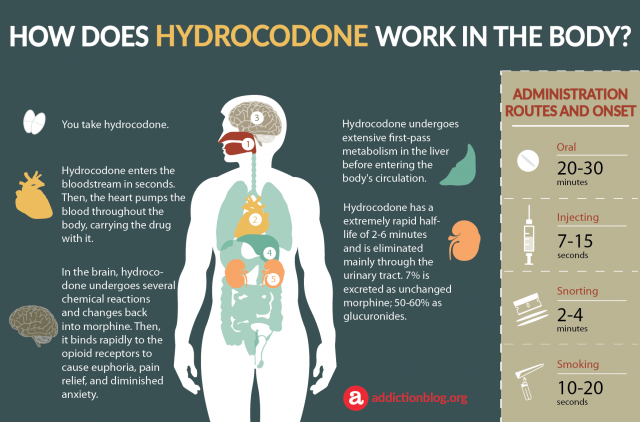Strong Addictive Properties
Doctors prescribe hydrocodone as a narcotic analgesic (pain reliever) and a cough medicine, usually combined with paracetamol (acetaminophen) or ibuprofen. Basically, hydrocodone is used to treat moderate to severe pain and as a medicine to treat cold and cough.
Hydrocodone is a semi-synthetic opioid in a group of drugs called “narcotic” pain relievers. It is a Schedule II or Schedule III drug (this varies as a result of different formulations) available only in combination with other ingredients, specifically intended for oral use. In fact, hydrocodone is contained in hundreds of prescription medications as an active ingredient.

However, many hydrocodone users take higher doses to achieve a sense of extreme well-being and euphoria. But taking hydrocodone OTHER THAN PRESCRIBED is considered drug abuse and is illegal.
Hydrocodone comes as a tablet, a capsule, syrup, a solution, an extended-release (long-acting) capsule, and an extended-release (long-acting) suspension (liquid) to take by mouth.
How Does Hydrocodone Work In The Body?
1. YOU TAKE HYDROCODONE: Hydrocodone can be taken orally, intranasally, intravenously, or by inhalation. Any, crushing chewing, smoking, snorting, or injecting hydrocodone is considered as an abusive method.
2. STOMACH: Hydrocodone can cause stomach upsets. Those who already have stomach problems such as ulcers will definitely experience a discomfort in their stomach after taking this medicine. Some people might even be allergic to the base the med had been delivered in (liquid or pill). If this is the case, look for a different version, or another manufacturer that uses a slightly different base or delivery method. If you take the extended release version, try the immediate release or vice versa.
3. NOSE: Hydrocodone is not intended to be used through the nose. This method of hydrocodone is abusive and can damage your nasal passages. Snorting hydrocodone can damage sinus cavities. The end result of chronic use of hydrocodone in this way is lost ability to smell and process mucus that protects your body from bacteria. This damage is irreversible. Hydrocodone is much more concentrated when snorted. This means that when it is administered in this way if floods the opiate receptors in the brain. The more you snort, the more you increase risk of overdose due to increased tolerance.
4. LUNGS: When hydrocodone is smoked the effects reach the brain almost immediately. However, as you’re inhaling hydrocodone, you are also letting various fillers and binders to reach their way to your lungs as well. These chemicals won’t be absorbed and their presence in the lungs may cause a number of health problems, including irritation. Another risk of inhaling hydrocodone is the risk of overdose, since a large amount of the drug may reach to the brain
5. HEART: Hydrocodone hits its peak blood plasma levels after about 1 hour. Some people crush and snort the powder from hydrocodone tablets to try to get more immediate effects, but this is dangerous and exposes you at greater risk for adverse effects or potential overdose.
6. BRAIN: When used as prescribed and with caution, hydrocodone relieves pain by changing the way the brain and nervous system respond to pain. It also relieves cough by decreasing activity in the part of the brain that causes coughing. Hydrocodone affects the body and brain by interacting as an opiate agonist at specific receptor binding sites in the central nervous and other tissues.
7. LIVER: The legitimate use of hydrocodone under doctor’s supervision has not shown any liver injuries or more serious damages. But the combination of hydrocodone and acetaminophen has been linked to many cases of acute liver failure due to unintentional overdose with acetaminophen.
Hydrocodone Dosage
- Tablets = 5mg hydrocodone, 500 mg acetaminophen every 6 hours as needed.
- Oral elixir = 5 mg hydrocodone/333 mg acetaminophen, or 10 mg hydrocodone/500 mg acetaminophen every 4-6 hours as needed.
- Oral solution = 10 mg hydrocodone/325 mg acetaminophen, or 10 mg hydrocodone/300 mg acetaminophen every 4-6 hours as needed.
NOTE HERE: Remember that any dose adjustment should be made in accordance with a doctor. Every attempt to self-regulate the dosage of hydrocodone can be dangerous due to the risk of overdose.
We understand it is difficult to talk to someone about your struggle. Check out our interactive Virtual Consultant to receive your treatment options easily.
Confidential and Free.
Your Questions
It is important to know the impact hydrocodone has in your system. Bear in mind that hydrocodone has powerful effects over both mind and body. It is a psychoactive drug. Make sure to keep in constant communication with your doctor should any side effects occur…and monitor your risk of both drug dependence and addiction..
Hope you like this hydrocodone infographic! And, if you still have questions about hydrocodone effects on the body, please leave them here. We are happy to respond to you with a personal, quick reply. If we are not able to answer your questions about hydrocodone, we will refer you to someone who can.








Related Posts